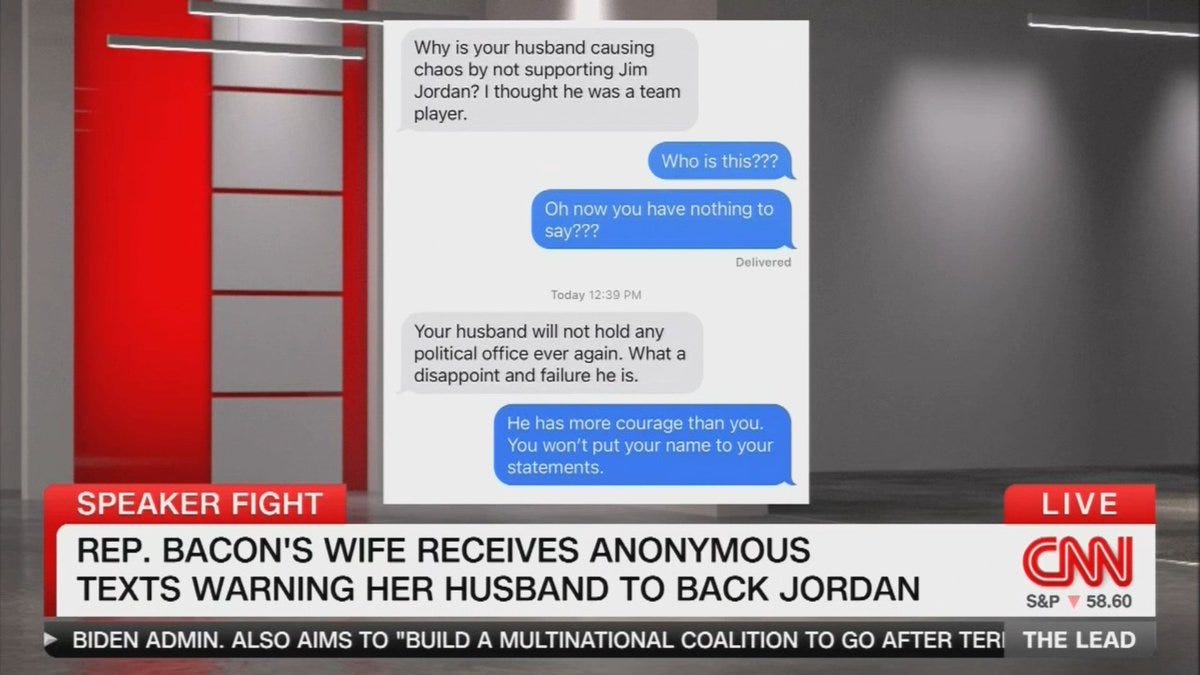MAGA Republicans are normalizing violent threats
We've seen numerous examples of it during Jim Jordan's flailing speakership bid.
Public Notice just celebrated its second birthday. Click the button to take advantage of our special anniversary offer.
It scarcely drew the attention of the media last month when Mitt Romney revealed in an Atlantic article — based on a forthcoming book about the senator — that a number of his fellow Republicans would have voted for Donald Trump’s second impeachment had it not been for fear of physical attack to themselves and their families.
Some of the reluctance to hold Trump accountable was a function of the same old perverse political incentives — elected Republicans feared a backlash from their base. But after January 6, a more existential brand of cowardice emerged. One Republican congressman confided to Romney that he wanted to vote for Trump’s second impeachment, but chose not to out of fear for his family’s safety. The congressman reasoned that Trump would be impeached by House Democrats with or without him — why put his wife and children at risk if it wouldn’t change the outcome?
RELATED FROM PN: The GOP’s embrace of violence is a major threat to democracy
Later, during the Senate trial, Romney heard the same calculation while talking with a small group of Republican colleagues. When one senator, a member of leadership, said he was leaning toward voting to convict, the others urged him to reconsider. You can’t do that, Romney recalled someone saying. Think of your personal safety, said another. Think of your children. The senator eventually decided they were right.
As dismayed as Romney was by this line of thinking, he understood it. Most members of Congress don’t have security details. Their addresses are publicly available online. Romney himself had been shelling out $5,000 a day since the riot to cover private security for his family — an expense he knew most of his colleagues couldn’t afford.
The House GOP’s current leadership fiasco is providing more examples of MAGA Republicans deploying threats as a political tactic. On Wednesday, Republican Rep. Don Bacon revealed that his wife received harassing text messages from an unknown person warning him against continuing to vote against Jim Jordan for speaker.
“They're harassing our spouses even,” Bacon told NBC of the Jordan faction’s tactics.
That wasn’t an isolated incident. Republican Rep. Mariannette Miller-Meeks said she “received credible death threats and a barrage of threatening calls” after not voting for Jordan earlier in the day. Another Republican congressperson, Nick LaLota, shared with a reporter a graphic death threat he received after he didn’t support Jordan on Wednesday. Other Republican members reported receiving threatening calls from Jordan supporters.
A note from Aaron: Working with brilliant contributors like Bradley and Scott requires resources. To support this work, please click button below and sign up for a free trial.
When threats of violence insinuate themselves into political decision-making on vitally important governing matters, the nation has reached a dangerous crisis point. The phenomenon has gained momentum in recent years, thanks largely to Trump. Now, however, Trump is joined by elected Republicans and news media personalities in the widespread incitement of hate speech that agitates for violent political assault. The immediate aims appear to be to instill fear and paralyze the opposition. But the endgame is far darker than this.
Embracing extremist views destroys the capacity of a civil society to function and poisons the political culture. Effectively, it means handing political power over to enraged mobs — incensed followers of would-be autocrats who wish to take matters into their own hands. In a country with such a strong gun culture as the US, the consequences are particularly worrisome.

It's easy for this dangerous new politics to get lost in the speeding blur of headlines, whether about the protracted Republican chaos over selecting a speaker of the House or the shock of Hamas’s attacks against Israel and Israel’s counterattacks in Gaza. There’s also the tendency of both the MAGA crowd as well as mainstream media organizations to not take Trump’s discourse seriously, but instead dismiss it as part of the far right’s normal rantings. But that’s exactly the point: to normalize threats of violence as if they are now part of everyday political discourse. It makes us numb to the barrage of actual assaults that take place by enraged right-wing zealots for whom hate speech and violence-inciting rhetoric are legitimate forms of public action.
Part of the normalization is to write off such perpetrators as crazed lone wolves. Yet the widespread availability of weapons in America, and the recurring drumbeat of reactionary militias motivated by ideas of redressing the “Great Replacement,” reflect a stunning fate for today’s politics. This is a country where violence thoroughly saturates the national culture, and increasingly, mainstream politics.
The two parties are not the same
The refusal of Republicans to function as one of two parties contending for power in the marketplace of ideas and policy, and their commitment to the basest forms of nihilistic obstruction on just about every important issue confronting the country — from climate change and gun control to immigration reform and support for Ukraine — virtually guarantees that the only way to break through any governing impasse is through destruction. Smash the deep state; cripple government agencies and co-opt or eviscerate legal institutions; kill the judges; lay barbed wire in rivers to flay desperate migrants; imperil elections; impeach independent civil servants; applaud the behaviors of tyrants; ban schoolbooks; attack women’s reproductive rights; assault the media; and impede the working class’s chances for a leg up.
America's media conglomerates bear a great share of responsibility for not identifying the vital political stakes, and for continuing to operate as if the two parties are somehow equivalent contenders for legitimate politics. The mainstream media have either refused or are too afraid to consider the limits of “free speech” in action. Too often they tuck tail and flee in fear of any direct challenge to basic violations of moral decency and mutual ethical respect.
How can such discourse be effectively countered? Many countries place limits on a category of rhetoric called “hate speech.” Most European countries, for example, have laws that sanction speech agitating for political violence against an ethnic or racial group, and many go much further. The European Union takes an extra-legal position, one that recognizes the limits of the law in this area of regulation. The EU’s Council of Europe sponsors a “No Hate Speech” social movement which aims to raise awareness of the danger through funding educational programs in schools. Several European countries — not limited to Germany — have quite draconian laws on the books aimed at making it a crime publicly to incite hatred against groups or arbitrarily to single out ethnicities or races through malicious slurs meant to violate their basic human dignity. Since 2017, Germany has even criminalized hate speech on social media sites. In the US, precautions taken by privately owned sites have been voluntary and piecemeal — and, in the case X (formerly known as Twitter), abandoned as a matter of policy.
MORE FROM PN: Jay Rosen on the mess at CNN and the perils of "both sides" journalism
In the cases beyond America’s shores, we see deliberate efforts to more carefully protect a vital sphere of public life. The goal is to invoke limits when it comes to language that mocks, defames, denigrates, or threatens persons or groups on the basis of their nationality, race, religion, or sexual orientation. This amounts to safeguarding decency and respect in political discourse, and in civic life more generally.
The United States, of course, enshrines free speech in the First Amendment to the Constitution, and that has meant protecting even the most virulent forms of hate speech. While speech that calls for imminent violence is not generally protected by the Constitution, the Supreme Court has ruled that in a great many instances, even hate speech should receive constitutional protections.
Social theorist Judith Butler argued in her book “Excitable Speech” that human beings are constituted by the language they use: our social existence is formed and reformed through the words used in private and public settings alike. What does it mean for a nation’s politics when political rhetoric is geared toward inflaming hatred and incentivizing threats of political violence? In such an arena, political adversaries are seen not as worthy opponents, but as enemies to be eradicated. Public power — and just about the entirety of civic life — then must be reconstituted to serve that pernicious end.
While defining the boundaries of allowable speech is unlikely and indeed, unimaginable in the United States, political commentators and elected Democratic Party officials could do a more pointed job of denouncing speech and behavior that transgress basic moral limits. This would serve the public interest at the very least by helping define what constitutes civil discourse and illuminate how over the top so much of the discourse today has become — spilling over, as it so often has, into violence.
Right-wing animus and a politics of transgression now engulf the GOP to an utterly dangerous degree. No candidate putatively challenging Trump for the nomination has dared to distinguish him/herself rhetorically, except in the most hushed and glancing of ways. GOP congressional colleagues have proven even more craven in their embrace of insurrectionary violence — to the point where 147 of them sitting in Congress in January 2021 voted to ignore a legal election and now appear comfortable that a leading candidate for the House speakership, Jordan, was among the most active of January 6 agitators.
Moving beyond denunciation
The politics of animus and violence must be openly countered and transcended. Doing so requires considerable effort across several fronts. Compiling a list of all the lies being told is a start. Journalistic exposes of scandals and studies of the suffering that victims undergo are also essential. And of course there have to be trials of corrupt officialdom, including definitive judgments rather than an endless series of appeals. Beyond that, there has to be a reckoning and a moral appeal that counters the animus of fascist violence with a sense of a constructive democratic future — one that draws upon the public’s common values and instincts and acknowledges their anger and frustration.
Policy-making is absolutely critical, but it must be buttressed by ceaseless conversations not about hatred and violence, but about political affect — that is, citizens defining and redefining agendas that will enthuse people. Some of this is already taking place outside of partisan policy circles. We’re seeing it when parents speak up at school boards to denounce book banning. Or when nurses, committed to their patients, organize for better pay, less onerous work conditions, and better protective gear. Pharmacists at chain store pharmacies are starting to organize on behalf of better coverage for their clients. Women’s groups are organizing to provide safe, legal abortion services for residents of states where those options are limited. School kids are making it clear to policy makers that the threat of school shootings is unacceptable.
The point to invoking these disparate practices is that there is a strong inclination for affirming common action that overcomes the dead end posed by the fascist recourse to violence.
The frustrations inevitably engendered by our market economy and by the legislative process create a political vacuum that fascism is quick to fill. Thus, the superficial appeal of the violent act. But the incitement to violence betrays a profound weakness of the right’s politics at this crucial moment in American history. When threats of violence are the only real means one has at one’s disposal, this suggests not a workable long-term political vision, but instead abject resignation masked by countless acts of political desperation — in speech as well as in deed.
That’s it for today
We’ll be back with more tomorrow. If you appreciate this post, please support Public Notice by signing up. Paid subscriptions make this work possible.







Yet again I almost deleted this email because I didn’t recognize the author. I have 101 unopened emails this a.m. and I pitch what looks like junk. Possible to put “Public Notice” first on the address line so it’s identifiable? This happens a lot.
MTG "Guns aren't scary. Bad people are" - as she shows a picture of her morally bereft self shooting guns. 🤦🏻♀️